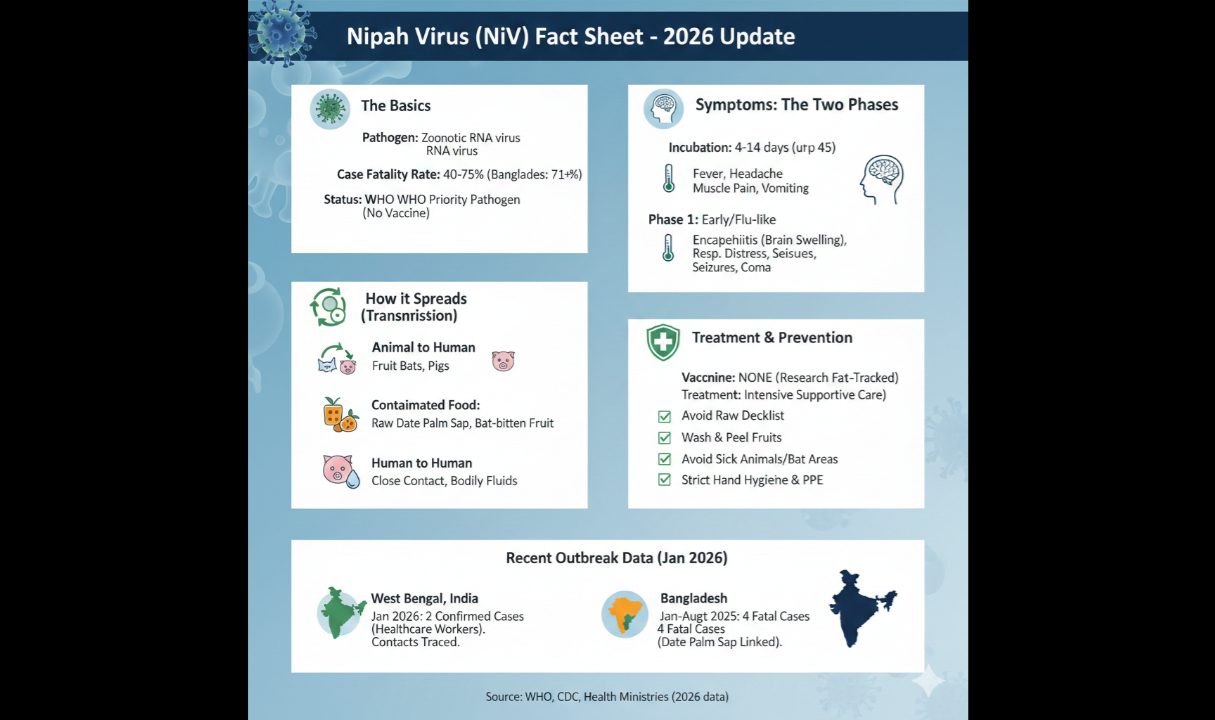Top Stories
Breaking the Black Box: How Artificial Embryos and Lab-Grown Wombs Are Unlocking the Secrets of Human Life
Policy Blueprint for Universal Basic Life Support Competency in Nepal: A Tri-Pillar Mandate

Nipah Virus: An Evolving Global Health Threat and the Path to Preparedness

APCAT Summit unites local governments to save lives from tobacco, TB, AMR and NCDs

Air Pollution in Kathmandu: Why the ‘Fluctuating’ AQI is a Silent Killer

Editor's Picks

The Chemistry of Feeling: Why Your Mood Starts in the Gut
About the Reviewer Sanjogta Thapa Magar, Microbiology Officer & Food Safety Specialist Sanjogta Thapa Magar is a highly skilled Food and Industrial Microbiologist dedicated to enhancing public health through rigorous food safety standards and microbiological research. Currently serving as a Microbiology Officer for the Kathmandu Metropolitan City, she focuses on urban health and food safety […]

Beyond the Bottleneck: A Blueprint for Sovereign Medicine Security in Nepal
Reviewed by Amrita Acharya, PhD Scholar (Pharmacy & Business Management) When a doctor in a rural health post in Karnali prescribes an antibiotic, they are acting on faith. Faith that the label matches the contents. Faith that the chemical structure hasn’t degraded in the heat. Faith that the regulatory system in Kathmandu has done its […]

Impacting positive change for those left behind
Written by Shobha Shukla (Managing Editor of CNS),Given the medical advancements today – in an ideal world, all children should be born free of infections like HIV, syphilis or hepatitis-B; all pregnant women should be accessing full spectrum of maternal and newborn care (including services to prevent vertical transmission of HIV, syphilis or hepatitis-B); and […]

Put people first mantra to drive WHO task force to save the medicines that protect us
Written by Shobha Shukla (Managing Editor of CNS),The United Nations apex health agency – the World Health Organization (WHO) – had announced the establishment of its first-ever civil society Task Force on Antimicrobial Resistance (AMR) in October 2025. This marks a major shift in addressing AMR which is not only among the top 10 global […]
Latest News
See all
From shadow to light: Supporting unhoused persons to access lifesaving TB services
Written byShobha Shukla (Managing Editor of CNS),Bobby Ramakant (CNS Health Editor)The risk of getting TB disease is among the highest in unhoused and other marginalised persons but the likelihood of them seeking public TB services is low – and finishing lifesaving TB therapy is even lower. The delay is long – very long – for […]

Advanced Clinical Analysis of Hydrosalpinx Management Before In Vitro Fertilization: Comparing Surgical Strategies and the Role of 3D Imaging Diagnostics
Reviewed byDr. Asmita Pandey, MD,Specialist in Obstetrics, Gynecology & ARTI. Executive Summary: The Necessity of Pre-IVF Hydrosalpinx Management The successful outcome of In Vitro Fertilization (IVF) cycles is significantly impaired by the presence of hydrosalpinx (HS), a common pathology among women with tubal-factor infertility.1 Clinical data consistently demonstrate that HS reduces pregnancy, implantation, and ultimately, […]

Tobacco-free and nicotine-free future is a bedrock to deliver on #EndTB and SDGs
Written by Shobha Shukla (Managing Editor of CNS),According to the latest WHO Global TB Report 2025 released a week ago, tobacco smoking is among the top-5 risk factors for the deadliest of all infectious diseases worldwide – tuberculosis (TB). In countries with alarmingly high tobacco use, like Indonesia, tobacco use is the biggest risk factor […]

Zimbabwe and Cambodia getting return on investment by addressing AMR
Written byShobha Shukla (Managing Editor of CNS),Bobby Ramakant (CNS Health Editor)Right to health is a fundamental human right. There is no doubt that everyone – without any exception or exclusion – should be able to live healthily in a rights-based manner – everywhere. Along with ensuring high to health is a reality for all, it […]

Gateway to universal access to SRHR is human right to health
Written by Shobha Shukla (Managing Editor of CNS),The human right to health is not a privilege, tt is a legal obligation – rooted in international human rights law – and must form the foundation of all efforts toward universal access, equity, and justice. Protecting, implementing, and enforcing this right is essential for the wellbeing of […]

World's largest TB prize illuminates Indian Molbio's tech innovation reaching the unreached
Written byShobha Shukla (Managing Editor of CNS),Bobby Ramakant (CNS Health Editor)World’s largest prize devoted to TB, the coveted Kochon Prize, was awarded to India’s Molbio Diagnostics for its technological innovation which is helping over 90 governments worldwide to reach the unreached with best of diagnostics (molecular tests). This is the third time India won Kochon […]
Health News
See allHistory in making as governments draft a legally binding Treaty for rights of older persons
Breaking the Black Box: How Artificial Embryos and Lab-Grown Wombs Are Unlocking the Secrets of Human Life

Policy Blueprint for Universal Basic Life Support Competency in Nepal: A Tri-Pillar Mandate

Nipah Virus: An Evolving Global Health Threat and the Path to Preparedness

APCAT Summit unites local governments to save lives from tobacco, TB, AMR and NCDs
Wellness & Lifestyle
See all
Beyond the Bottleneck: A Blueprint for Sovereign Medicine Security in Nepal

Impacting positive change for those left behind

Put people first mantra to drive WHO task force to save the medicines that protect us

From shadow to light: Supporting unhoused persons to access lifesaving TB services

Advanced Clinical Analysis of Hydrosalpinx Management Before In Vitro Fertilization: Comparing Surgical Strategies and the Role of 3D Imaging Diagnostics
Research Watch
See allNew Study Reveals Hidden Environmental Drivers Behind Nepal’s Ongoing Cholera Battle
The Silent Pandemic: Kathmandu’s Poultry Industry Is Breeding Untreatable Superbugs
The Silent Emergency: Domestic Violence and the Mental Health Crisis Among Nepalese Women
Nepal’s Drug-Resistant TB Rates Hold Steady, but New Antibiotic Resistance Sparks Concern
Rare Adult Case of IgA Vasculitis in Nepal Mimics Chronic StomachIssues for a Year
One in Three Pregnant Women in Pokhara Experiencing SevereStress, New Study Shows
Specialized Care
See all
Gateway to universal access to SRHR is human right to health

World's largest TB prize illuminates Indian Molbio's tech innovation reaching the unreached

Amidst anti-gender push, hope pins on ICFP 2025 to shift gears towards SRHRJ for all

Study proves strong impact of taking molecular TB diagnostics closer to the people
Featured Story

Amidst anti-gender push, hope pins on ICFP 2025 to shift gears towards SRHRJ for all
Written by Shobha Shukla (Managing Editor of CNS),Despite right to health and gender equality being fundamental human rights, the world is off the track from delivering on these goals in next 62 months (by 2030). Anti-rights and anti-gender pushbacks have made the situation even more grim. Activists are pinning hope on an upcoming global meet […]
In Depth
Long Reads
Defective Sperm and Pregnancy Complications: Understanding the Connection and Its Impact

Supporting and Educating Strategies for Children with Autism Spectrum Disorders

Flaxseed: An Ancient Superfood for Today’s Health and Wellness

Epistaxis
Quick Headlines
Rising Heat and Our Minds: The Overlooked Link Between Climate Change and Mental Health
Antibiotic resistance: A Global threat and an unseen pandemic
Skipping Breakfast, Missing Health: What Nepal’s Adolescents Are Really Eating
The Growing Crisis of Adolescent Obesity in Nepal : Causes, Consequences, and Solutions
Opinion & Analysis
Micro plastics: A Silent Threat to Reproductive Health and Fertility
About the Reviewer Dr. Asmita Pandey, MD Specialist in Obstetrics, Gynecology & Assisted Reproductive Techniques (ART) Dr. Asmita Pandey is a distinguished specialist in Reproductive Medicine, recognized for her clinical expertise and research contributions to the field of fertility. She specializes in Assisted Reproductive Techniques (ART), providing evidence-based solutions for complex reproductive challenges… See Full […]
Is Your Medicine Cabinet Missing This? Laughter’s Amazing Benefits
About the Reviewer Liza Nagarkoti, B.Sc. Nursing, M.A. Food & Nutrition,Health Officer & Clinical Researcher Specializing in Emergency Care, Maternal Health, and Therapeutic Nutrition Liza Nagarkoti is a seasoned Registered Nurse and Clinical Nutritionist with over 7 years of frontline experience in tertiary healthcare and humanitarian settings. Holding a Master of Science in Food and Nutrition and a Bachelor of Science in […]
Advancing Kidney Health: Transforming Innovative Concepts into Practical Solutions
About the Reviewer Dr. Nabin Bahadur Basnet, MBBS, PhD, FISN, Consultant Nephrologist & Specialist in Interventional Nephrology Dr. Nabin Bahadur Basnet is a world-class Nephrologist and researcher, distinguished by his dual expertise in clinical renal care and advanced medical science. He holds a Ph.D. from Hiroshima University, Japan, and is a Fellow of the International […]
Explore Health Topics
More Stories
See all
Study proves strong impact of taking molecular TB diagnostics closer to the people

Rising Heat and Our Minds: The Overlooked Link Between Climate Change and Mental Health

Antibiotic resistance: A Global threat and an unseen pandemic

Skipping Breakfast, Missing Health: What Nepal’s Adolescents Are Really Eating

The Growing Crisis of Adolescent Obesity in Nepal : Causes, Consequences, and Solutions

Dietary Pattern and Nutritional Status among Healthcare Professionals
Get The Health Thread delivered to your inbox
Join thousands of readers who start their week with our curated health news, research breakthroughs, and expert analysis. Free, every Monday.
No spam, ever. Unsubscribe anytime.
Latest Headlines
Defective Sperm and Pregnancy Complications: Understanding the Connection and Its Impact
Supporting and Educating Strategies for Children with Autism Spectrum Disorders
Flaxseed: An Ancient Superfood for Today’s Health and Wellness
Epistaxis
Exploring the Role of Metabolic Psychiatry in Understanding Mental Health Disorders
Micro plastics: A Silent Threat to Reproductive Health and Fertility
Is Your Medicine Cabinet Missing This? Laughter’s Amazing Benefits
Advancing Kidney Health: Transforming Innovative Concepts into Practical Solutions
Chilies, is it only hot or more?
A hope for spinal cord injury
New research in pancreatic cancer screening
Exercise and aging: maintaining mobility and independence
Tubal Blockages and Infertility: Understanding Causes, Diagnosis, and Treatment Options
“Ethical Health Journalism, from Kathmandu to the World”
The Health Thread bridges the gap between complex medical research and everyday readers. Our team of certified journalists and medical reviewers ensure every article meets the highest standards of accuracy and ethics.